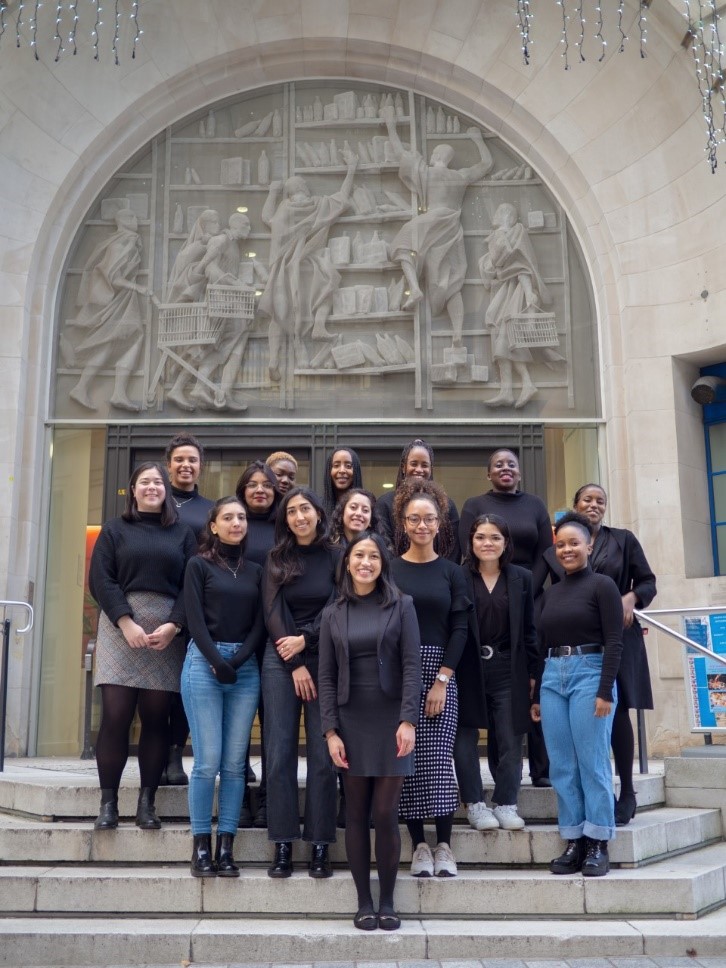As a future graduate, I am often overwhelmed by the many challenges that one can face when trying to succeed in the labour market. Last October, I joined “Women of Colour in Consulting” (WoCo), a student-led organization at LSE that seeks to create a network of women with similar professional aspirations and backgrounds by exchanging experiences, in addition to providing information about job opportunities in the consulting field.
Join any of the more than 200 societies at LSE to expand your social network and develop new skills
I talked to Mirabella Pulido, founder of WoCo, and Mónica Abad-Yang, anchor at WoCo’s partner podcast, Can You Hear Us?, to discuss the motivations for starting this organisation, what kind of activities and opportunities it offers to its members and how it generates an impact in society.

Source: Mirabella Pulido. Logo by: Good Guy Branding
Can you tell us a bit about WoCo and how you came up with the idea for this initiative?
Mirabella: WoCo is an organisation that provides visibility and support for women of colour (WOC), a heavily underrepresented demographic not only in consulting, but in the professional sphere as a whole.
It started last fall when I was looking to apply to internships in consulting. As a Filipino-American, I could not identify any WOC in consulting in my network who I could reach out to for advice. As a result, I decided to create a small group of women with similar identities and professional interests. As an MSc in Development Management student, I reached out to some faculty members and staff in the International Development department, who were very supportive and helped me launch the initiative. As the group grew rapidly, we expanded across other departments on campus and now have more than 40 members.
What kind of opportunities and activities does WoCo provide to its members?
Mirabella: WoCo offers support that is uniquely tailored to our identities and what we are looking for in future employers. We meet bi-weekly and showcase professionals and leaders of colour who can provide career support and networking opportunities. It is always valuable to see someone who resembles us in the field that we are interested in and who we can look up to as role models.
How does WoCo complement the resources provided by LSE Career Hub?
Mirabella: WoCo adds to the information and tools already provided by LSE by allowing for a more personal space and closer interactions. It provides a safe space where all members and speakers can exchange their experiences openly. We also emphasize the challenges that women of colour might face in the workplace, such as microaggressions, or other difficulties related to racial or cultural backgrounds.
How do you think WoCo can generate a positive impact in society?
Mirabella: WoCo pushes for more visibility for marginalised identities, especially intersectional minority groups, which are often overlooked. The organisation can help professionals recognise the importance of having a diverse team, as diversity in background leads to diversity in perspectives, insights and solutions. It also shows future cohorts that if they want to advocate for a specific cause, LSE is a great place to start and develop their initiative.
Diversity in background leads to diversity in perspectives, insights and solutions.

Photo by: Calvin Zehnder
How has WoCo contributed to your student experience at LSE?
Monica: WoCo has helped create a network of women with diverse backgrounds and similar professional aspirations, in which we all bring something new and different, and we all can learn from each other. The society not only provides a space to share information about job applications and interviews, but it is also a great place to meet new friends, especially during COVID.
Can you talk a bit about the podcast Can You Hear Us? and its main objective?
Monica: I think the main objective of the podcast is simply to give a voice to women of colour and to have an open conversation about what is it like to be a minority in the sector of international development. We also put a spotlight on fields like entrepreneurship, consulting and academia. You can access the podcast through all the major audio platforms like Apple, Spotify and Google, and each episode is about 50 minutes long.
What advice would you give to other students of colour who feel that their identity might be an obstacle to achieve their career goals?
Monica: As a half-Spanish, half-Taiwanese woman, I can account that belonging to a minority can be more challenging in the career field. However, my advice to other WOC would be to not be scared to take up space. Know your worth, know your stance and know your limits, and feel free to openly discuss about topics related to diversity in the workplace.
Advocate for what you believe in and enrich your student experience by starting your own society at LSE.
Find out how you can create your own society or club at LSE.
Note: This article gives the views of the authors, and not the position of the Social Policy Blog, nor of the London School of Economics.





